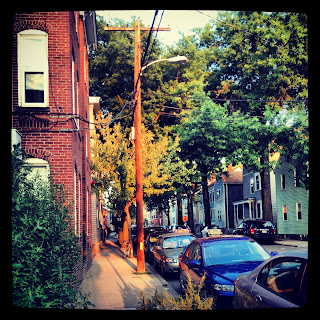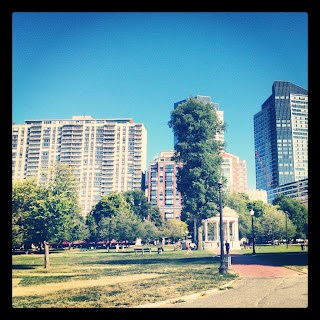Ok so I got to Boston on September 1st, 2013! It was my first time there, and it was going to be my home for one year. I had a couple of huge bags and I wasn't sure on how to get to my place. The thing I did I think is the most convenient you can do: use a cab to get home for the first time.
It's not like you can't use the T, but for example, if you live in Cambridge, you have to take the blue line 4 stations to Gov. Center and then connect with the green line and go 4 more stations to get to Lechmere. If you live more towards MIT area, you might have to connect with the red line which will be a pain if you try to do it from the airport. Talking clear, the T is just a $2 ride, the cab might be $25 or so, but the pain of having to carry the bags through lots of stairs and getting on and off of the T makes it totally worth it.
Talking about the T, the green line is the principal line and it's always really confusing for new students, check this map out:
The Green line is divided in 4 "sub-lines": the E, the B, the C and the D. They separate themselves after the Copley station. This is important because if you want to go for example to Longwood Medical Area, is not like you just have to take the green line, you have to take the E. Also, If you want to come back straight to lechmere (east Cambridge), only the E will take you straight there, whereas other lines like the B, C or D might take you just to government center or north station. Also, the T is not always underground, so if you see some sort of small train in the middle of the street, that's the subway. It goes under or above ground at different stations.
Back to Boston, the city is amazing. Is one of the oldest cities in the US. I highly recommend you to just walk around the first days to get familiarized with the area. This are some pictures I took the first day I decided to go and take a walk:
Of course, it's very important to go to Fenway Park and see the Red Sox stadium. I'm a Yankee fan so I didn't like it so much, but I must admit is a landmark of the city and of baseball history.
The Hult campus is beautiful. It's just next to the Charles River and it has a really nice park in front. Here some pictures:
One of the first things that really caught my attention was that a lot of people were giving away furniture and used equipment in the streets. That's because most of the people graduate from their programs in summer and they start moving out of their apartments. New people start coming in and clean everything, leaving stuff on the streets that sometimes might be useful for other people who want them. This is an example:
It says: "Free, take me home". The couch was in really good conditions!
There are so many things to do in Boston...I have been in more than 5 amazing concerts in different places, the sports teams are also something very important in the city: the Bruins, the Red Sox, the Patriots and the Celtics are the four main teams that everyone roots for in the city. Go to a game of each is mandatory during your stay in Boston!
Talking about weather I can say that each season is fairly different than the other, winter can get incredibly cold and summer incredibly hot. I really like that because there are so many different activities to do in each season that you never get bored. This is a picture I took in four seasons at Boston:
There are many excellent restaurants in the city, but so far you must go to Top of the Hub at Prudential Center. The view is simply astonishing and the food is really good.
Finally, you should totally go to Harvard and MIT as the biggest and perhaps most prestigious universities in the world.
Well, I hope these comments can help you out to feel more prepared to go to Boston and enjoy all the incredible things the city offers. Anyway, if you ever feel like you have seen it all in the city, you can always take a bus 4 hours to New York with greyhound (www.greyhound.com) or just rent a car and go to New Hampshire (where is incredibly cheap to shop because there are no Value Added Taxes) or go to Maine during Fall to see all the trees changing colors (which is supposed to be one of the most beautiful things to see on the east coast). Anything you do just remember that part of your program is not just classes but living in an amazing city and having fun!!
In the next post I will talk about the first day at Hult (integration day) and later on I will start the posts for each module! stay tuned!























